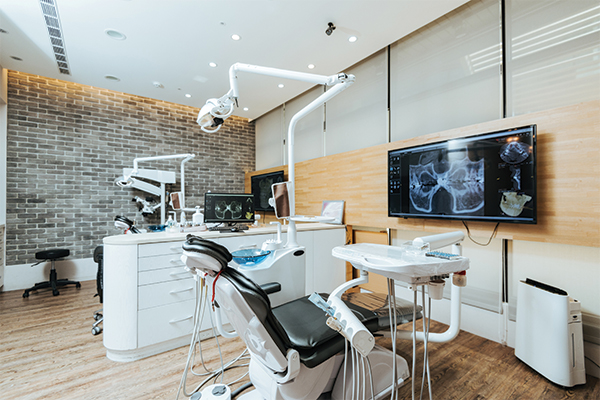Dental clinics handle a large amount of patient data known as protected health information (PHI). PHI is private information in medical records that is used to identify a specific individual, and is disclosed during a patient's diagnosis or treatment. This includes:
- Address
- Date of birth
- Phone number
- Email address
- Social Security number
- Medical history
- Mental health condition
- Laboratory tests and results
- Insurance information
As a dental health provider, it’s your responsibility to ensure your patients’ information is safe and handled properly. Not only are your patients concerned about how you handle their private information, but you are also mandated by industry compliance standards to ensure patients' data privacy.
What is data privacy?
Data privacy is a part of data security that centers on how patient data is collected, stored, and shared. In the context of dental clinics, practicing data security ensures that they will only use the information shared by patients for their intended purpose.
Why is data privacy important?
Having a strong data privacy program reduces the risk of security incidents that can cause privacy breaches. In addition, it saves your clinic from paying fines, lawsuits, and multi-year penalties.
According to Forbes, 46% of companies in the US experience a privacy breach which damaged their brand value and reputation. And don't think your dental clinic is safe — it's not.
Here's an example. In 2019, Elite Dental Associates was fined $10,000 by the Office for Civil RIghts (OCR) for violating the privacy rules of the Health Insurance Portability and Accountability Act (HIPAA).
Elite disclosed the private information of one of its patients as a response to a social media review. The response included the patient's last name and information regarding that patient's health condition. In addition, the OCR discovered that Elite had also disclosed the data of multiple patients on its Yelp review page. To make matters worse, Elite did not have any policy or Notice of Private Practices that complied with HIPAA privacy rules.
In addition to the fine, Elite was required to go through a corrective action plan plus two years of monitoring by the OCR to ensure their compliance with HIPAA rules.
Data privacy and data security
Data privacy and data security may sound the same, but they're different from one another. Data privacy are policies governing how patient data is collected, stored, and shared. The latter, on the other hand, is concerned with how patient data stored in your dental office is protected from intruders. You can even say that data security is necessary for enforcing data privacy.
Data privacy best practices
To ensure the safety and security of your patients' data, here are some data privacy best practices you should implement in your dental practice:
1. Provide your staff with data privacy awareness training
Your dental clinic must provide data privacy training and implement a corporate data privacy policy to anyone who handles PHI. This is to ensure your staff understands how to handle and safeguard your patients' private data.
2. Use sophisticated security tools
There are a lot of security tools you can use to keep private patient information safe. Some of these tools include password managers, encrypted storage solutions, and virtual private networks (VPNs). If you’re not sure which ones to use, you can consult with a managed IT services provider like Pact-One.
3. Observe your network for suspicious activity
This allows you to detect and prepare for a potential cyberattack. Some signs to look out for include:
- Abnormal database activity – This can be caused by either an external or internal attack. Signs of abnormal database activity include unusual data content growth and changes in users and permissions.
- Account abuse – This is a sign of an insider attack that involves accessing and sharing private information and modifying audit trails.
- Changes in user access – These can mean that a hacker is attempting to access your network using stolen user credentials. Signs to watch out for include multiple failed login attempts, logins at odd hours, and inconsistencies between a user and a specific device.
- File changes – This indicates that a hacker has breached your network and is changing files to avoid detection.
- Unusual network behavior – This is another sign that hackers are trying to infiltrate your network. Things to look out for are sudden changes in network performance and protocol violations.
- Unauthorized port access – This can either be caused by someone accidentally accessing the port or a malware attack.
4. Don't think you won't be targeted
Never dismiss the possibility that your dental clinic will be targeted by cybercriminals. In fact, hackers prefer to target smaller businesses and healthcare organizations because these often lack solid cybersecurity protocols.
5. Implement a zero trust policy
A zero trust policy is a security initiative that eliminates the concept of trust in and out of your dental clinic. It requires implementing the principle of least privilege, which limits your staff's network access to only the resources they need to accomplish their tasks.
Is your dental office well-equipped to keep your patients' data safe? Without the proper antivirus software and data backup policy, you're putting your patients' information at risk. This is where a dental IT provider like Pact-One can help. Our network security services will provide you with a multilayered security solution that will stop malicious elements from breaching your network. Contact us today to learn more.
Dental IT. Remove the Burden. Embrace the Use.
Quality patient care – it's ultimately why you became a dental professional. But, some business operations can get in the way (such as pesky computer issues or lack of IT support). That’s where Pact-One Solutions can help! Our passion lies in supplying reliable, responsive dental IT support and security that practices can count on.
Whether you’re looking for dental IT services for your startup or searching for more responsive dental IT support – our team of dental IT specialists have you covered. With team members throughout the United States, we offer nationwide support to dental practices of all sizes. Our wide range of dental IT services ensure your data is secure, accessible, and protected.
Don't let technology challenges hinder your ability to deliver exceptional dental care. Contact us at info@pact-one.com or 866-722-8663 to join 350+ dental practices thriving with the support of a dedicated dental IT team.


